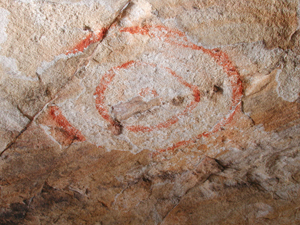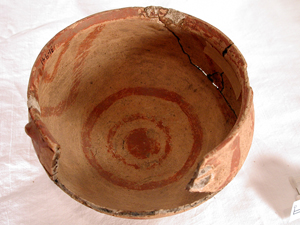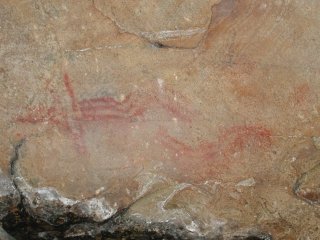What are rock art styles?
Archeologists use the term style to refer to design characteristics or decorative techniques applied in the making of an artifact. Stylistic features are often used to convey information, such as the identity of the maker or owner of the artifact or the identity of the group to which he or she belongs. Distinctive styles generally correspond to specific time periods and/or geographical regions. Archeologists define styles in relation to specific design features such as shape, texture, color, decorative mode, and quality of craftsmanship. You can think of style in relation to the kinds of clothing you wear today for school or for work, for leisurely or sporting activities, and for special "dressy" occasions, as compared to the clothing worn for the same activities and occasions a century ago.
Rock art images can also exhibit stylistic variation. Most rock art style definitions are based on geographical variations in production techniques and motif categories and treatments. This works well in areas such as the American Southwest, where rock art motifs are complex. In Arkansas, rock art is dominated by enigmatic abstract and geometric motifs along with a wide variety of rather simple images of humans, animals, plants, and objects. We can distinguish regional variability in the frequency of major rock art types (pictographs versus petroglyphs), geometric designs, and naturalistic subjects, but these variations do not sort very well into discrete regional styles. On the other hand, many rock art motifs are similar to designs rendered on other artifacts, making it possible to study variation in rock art designs as part of broader stylistic complexes. This approach puts rock art into a larger comparative framework that includes artworks on different media and from different kinds of archeological sites.
One rock art style identified in Arkansas is called the Petit Jean Painted style. It is represented by pictographs found on sites located in the Petit Jean Mountain region of the central Arkansas River Valley. The characteristics of this style include the use of red pigments to create finger-painted line drawings of geometric motifs as well as naturalistic animal and plant forms in solitary and group arrangements. |
| Home | Quick Facts | Interpretations | Articles | Technical Papers | Resources | Database | Just For Kids | Picture Gallery | Buy the Book! |
|
Last Updated: April 11, 2007 at 8:40:42 AM Central Time
|



